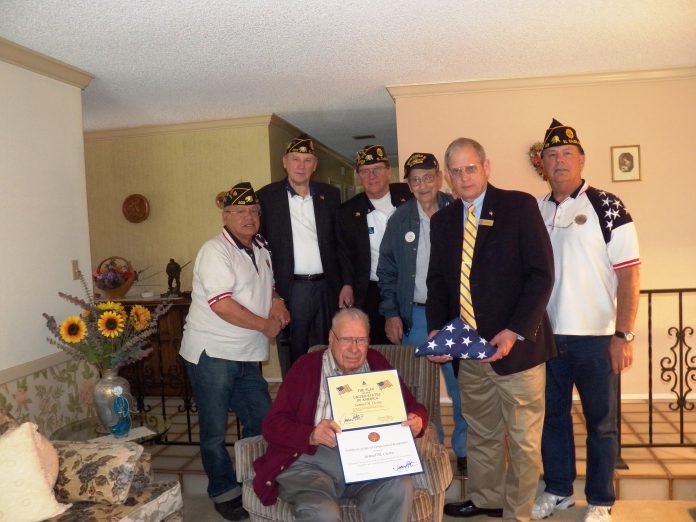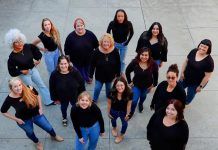Longtime East County resident Samuel M. Cicora was honored at his home on April 3, by a visiting delegation of officers from El Cajon American Legion Post 303. Cicora served in the U.S. Army during World War II, earning the rank of Staff Sergeant during combat in New Guinea and the Philippines. He turns 96 on May 14.
Longtime East County resident Samuel M. Cicora was honored at his home on April 3, by a visiting delegation of officers from El Cajon American Legion Post 303. Cicora served in the U.S. Army during World War II, earning the rank of Staff Sergeant during combat in New Guinea and the Philippines. He turns 96 on May 14.
Cicora was recognized for his military service and for 70 years of membership in The American Legion. Cicora has been a Legionnaire at Post 303 since 1985, after he and his wife moved to El Cajon from New Jersey to join their Navy ensign daughter, who was stationed in San Diego at the time.
Post 303 officers in attendance were Commander Rob Tade, 1st Vice Commander Ronnie Murphy, 2nd Vice Commander Wes Schermann, Adjutant Jim McKay, and Acting Chaplain Donald Showe. Post member Tony Santos, like Cicora a veteran of the Second World War, reminisced with Cicora over memories of contemporaneous military service in nearby combat zones.
Commander Tade honored Cicora with a 70 Year Certificate signed by the National Commander and the National Adjutant of The American Legion, as well as a 70 Certificate that he and Adjutant McKay had signed and a PUFL (“paid up for life”) Coin reading “Member by service, PUFL by choice.” Schermann presented to Cicora an American flag that had flown over the U.S. Capitol Building in Washington and a Congressional Certificate recognizing his service and longevity with the Legion, which had been signed by Congressman Duncan D. Hunter. The group also gave Cicora other veteran-related pins and coins, as tokens to honor him.
Cicora recounted his wartime service and peacetime career, contrasting the circumstances of life then with those now. He worked with anti-aircraft artillery and anti-tank field artillery, traveling with the infantry and often working with air units.
“We were always moving, moving, moving,” he said.
He told of how at each new encampment all the soldiers did all the jobs, unlike the modern Army’s emphasis on specializations.
“We cut the grass, put up the tents, watched for Japanese planes—and always kept that steel helmet handy. It wasn’t like it is now.” He described New Guinea as “a lot of stress,” then shook his head about the recent on-base attack at Fort Hood, saying, “We were all in combat. I don’t understand this post-traumatic stress. We all had stress, and we didn’t do this.”
After separating from the Army, Cicora and his Navy nurse wife returned to New Jersey, where he worked as a letter carrier for 41 years. A first-class postage stamp cost three cents then. He shared with his guests that he still keeps track of postal service news, worrying about the replacement of email for hand-written letters that are personal and thoughtful. He believes people then were friendlier and more involved with watching out for each other as neighbors.
“At Christmas in New Jersey,” he said. “Everybody gave something to the mailman.”
He has become less active with age, no longer driving or attending Legion meetings. A cousin is his caregiver.
On the few occasions Cicora ventures out of his home, he wears a military-insignia ball cap and he is approached by young veterans of the conflicts in Afghanistan and Iraq, who thank him for his long-ago service and speak briefly of their shared experiences across generations.
“We had a terrific Army, but we were paid peanuts,” Cicora said. “I guess that really isn’t much different now.”














